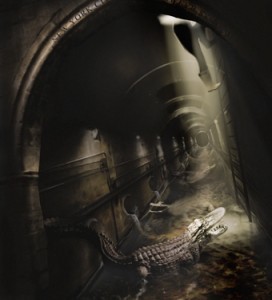Main Piece: A New York Baptism is either the first time you get badly splashed by a taxi in NYC or the first time mysterious droplets (which might not be water) from above trickle onto your forehead.
Context: The informant (OC) is half Paraguayan and half American, and she speaks both Spanish and English. Her mother immigrated to the U.S. as a young adult, so the informant is first generation, but the rest of her mother’s side of the family resides in their home city – Caazapa, Paraguay – and are very well-known in their community. Her father’s side of the family are “classically Jewish” people from Sheepshead Bay, Brooklyn, New York. Although she is not religious herself, her upbringing was culturally Jewish and Catholic. Our discussion took place in her home in Orlando, Florida while her mom made us tea and lunch in the background. As stated in the main piece, OC has heard multiple different variations of the joke, both originating from New York City situations. She originally heard the iterations of the joke from her immediate family based in Brooklyn, NY and finds the sayings funny for their grudging celebration of uniquely New Yorker situations as well as their play on the concept of baptism, given that she grew up in a religious family but still remains skeptical of organized religion. She also has personally experienced a New York Baptism and delights in witnessing the bewildering baptisms of others.
Personal thoughts: The New York Baptism joke is essentially a coping mechanism to deal with the poor conditions of an overpopulated and polluted city. Baptisms are generally seen as wonderful ceremonies where you are reborn into the purity of God’s forgiveness and light, so to place such “negative” experiences on par with a baptism seems discordant and ironic. However, the juxtaposition between the uncleanliness of the city and the purity of religious experiences makes us question what the difference really is between a baptism and dirty city water. Who’s to say that whatever splashed onto your forehead isn’t Holy Water? Are our religious ceremonies really that “pure” anyways, or are we just placing arbitrary concepts of dirty and clean onto a world that will always, in some way, be dirty? To come back to my original point, the joke takes the undesirable concepts of mysterious substances and inconsiderate taxi drivers and turns them onto their head. Although New York is crowded and dirty, those conditions are out of any individual New Yorker’s control, so why not embrace them? People will always call New York home with all the love and devotion in the world, which is why mysterious liquids are not seen as something to be disgusted with, but rather cherished like you would cherish an annoying but lovable family member.

